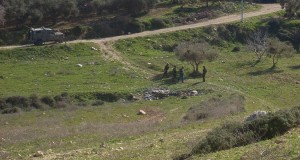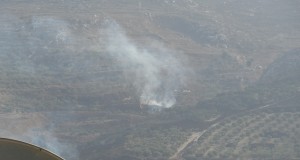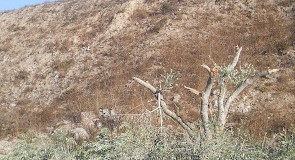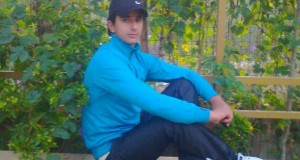4 February 2013 | Mondoweiss Saturday morning moments after Palestinians planted metal huts and canvas tents on a rocky hilltop in the northern West Bank village of Burin, Israeli settlers were pelting them with rocks. Armed with slingshots and at ...
Read More »Palestinians protest Israel’s illegal settlement policy by establishing new village “Al-Manatir” near Burin, Nablus
Update on 4 February: In what seems to be a collective punishment for last Saturday´s construction of al-Manateer neighbourhood on privately owned Palestinian land (classified as Area B, according to the Oslo Accords) in Burin, Sunday night saw the Israeli ...
Read More »Big punishments for small hopes
by Haroun Zeitoun 26 January 2013 | International Solidarity Movement, Burin, Occupied Palestine This morning in Burin, the village that sits in the valley between the Yizhar and Bracha colonial settlements just south of Nablus, saw a small yet high-spirited ...
Read More »Settlers set ground on fire in Salman Valley, Burin [Update: Video added]
By Stephen Alexander November 6th 2012 | International Solidarity Movement, West Bank Today at around sundown, settlers from the illegal Israeli settlement of Yitzhar set fire to the ground in the Salman valley in Burin. The fire was in the ...
Read More »Settlers set Palestinian land ablaze in village of Burin
By Alex Marley 15 September 2012 | International Solidarity Movement, West Bank In the afternoon of Tuesday, 11 September 2012, settlers from the illegal Israeli settlement of Yitzhar burned farmers’ land containing almond trees in the Palestinian village of Burin. ...
Read More »Settlers destroy 18 olive trees Burin
By Alex Marley 11 September 2012 | International Solidarity Movement, West Bank Eighteen Palestinian-owned olive trees were destroyed by Israeli settlers in the village of Burin, near Nablus, when the illegal settlers attacked the Palestinian land on Tuesday 4 September ...
Read More »Night raids and arrests continue in Burin
By Alma Reventos 25 August 2012 | International Solidarity Movement, West Bank On Thursday August 23, Mumen Mahmoud Raja, 18, was arrested at his home by Israeli occupation forces at 2:30 a.m. Around 2 a.m., some 60 Israeli forces invaded ...
Read More »Sleepless nights in Burin
By Alma Reventós 25 July 2012 | International Solidarity Movement, West Bank “I have not slept all night.” The words of a young man from the Bilal Al-Najjar youth cultural center in Burin, after a night of raids by the ...
Read More »Burin: arbitrary arrests continue
By Maria Erdely 22 May 2012 | International Solidarity Movement, West Bank Castro Risaq was arrested on the night of the May 1 in Burin, a village just 7 kilometres south west of Nablus. The Israeli military arrived at 1 ...
Read More »Burin Youth Center targeted once again: 10 youth arrested in 200 soldier raid
by Lydia 21 April 2012 | International Solidarity Movement, West Bank In a quick and clean opperation, the Israeli Occupation Military managed to arrest 10 young men in two hours, forever altering the next few months or even the next ...
Read More » International Solidarity Movement Nonviolence. Justice. Freedom.
International Solidarity Movement Nonviolence. Justice. Freedom.




